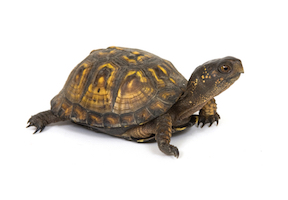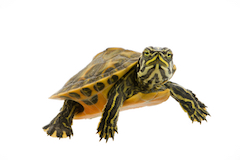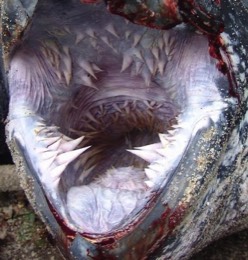What Do Turtles Eat?
Below we answer the question, “What do turtles eat?” in great detail, including in-depth explanations on what to feed both terrestrial and aquatic pet turtles in captivity.

What do pet turtles eat?
Terrestrial Turtle Foods
Terrestrial turtles spend most of their time on land, and the foods these turtles eat reflects their land-based existence. The quintessential example would be the Box turtle family, which includes common North American varieties such as the Eastern, Three-toed, Ornate, Florida, and Gulf coast box turtles. Wood turtles and Bog turtles would also be considered terrestrial reptiles.
These land-based turtles feed primarily on live insects as babies and juveniles, preferring earthworms, slugs, waxworms, snails, and mealworms. Insects can be offered in a food dish, or let loose in the terrarium so that the turtles can hunt them down and feed naturally. As they grow, these terrestrial turtles begin adopting a more omnivorous diet, meaning a more balanced mix of insects and vegetation.
Vegetable foods can include shredded carrot, mixed greens (kale, collared greens, bok choy—avoid lettuce), hibiscus, dandelion, chopped squash, peas, and sweet potato. Avoid offering boiled foods to your turtle, as boiling denigrates the nutritional value of the food.
When feeding protein-based foods, avoid hamburger, or any meat slices—whole foods are always best. Meat strips or cutlets are minimally healthy and lack a diverse vitamin and mineral component. Limit the amount of citrus fruit as well, as the acidic nature isn’t beneficial in high doses.
When feeding turtles on land, it’s important to dust their foods with an appropriate amount of calcium for proper bone and shell growth, as well as utilize a quality UVB (ultraviolet) light to promote the synthesis of vitamin D3, which is crucial for these reptiles and their appetites.
Avoid feeding your turtle a diet of foods high in phosphorous (fish, seeds, nuts, beef, beans), which can help lead to MBD (metabolic Bone Disease) due to its effect upon calcium absorption within the body.
Terrestrial Turtle Foods
Terrestrial turtles spend most of their time on land, and the foods these turtles eat reflects their land-based existence. The quintessential example would be the Box turtle family, which includes common North American varieties such as the Eastern, Three-toed, Ornate, Florida, and Gulf coast box turtles. Wood turtles and Bog turtles would also be considered terrestrial reptiles.
These land-based turtles feed primarily on live insects as babies and juveniles, preferring earthworms, slugs, waxworms, snails, and mealworms. Insects can be offered in a food dish, or let loose in the terrarium so that the turtles can hunt them down and feed naturally. As they grow, these terrestrial turtles begin adopting a more omnivorous diet, meaning a more balanced mix of insects and vegetation.
Vegetable foods can include shredded carrot, mixed greens (kale, collared greens, bok choy—avoid lettuce), hibiscus, dandelion, chopped squash, peas, and sweet potato. Avoid offering boiled foods to your turtle, as boiling denigrates the nutritional value of the food.
When feeding protein-based foods, avoid hamburger, or any meat slices—whole foods are always best. Meat strips or cutlets are minimally healthy and lack a diverse vitamin and mineral component. Limit the amount of citrus fruit as well, as the acidic nature isn’t beneficial in high doses.
When feeding turtles on land, it’s important to dust their foods with an appropriate amount of calcium for proper bone and shell growth, as well as utilize a quality UVB (ultraviolet) light to promote the synthesis of vitamin D3, which is crucial for these reptiles and their appetites.
Avoid feeding your turtle a diet of foods high in phosphorous (fish, seeds, nuts, beef, beans), which can help lead to MBD (metabolic Bone Disease) due to its effect upon calcium absorption within the body.

Statistically, most pet turtles are aquatic in nature, and aquatic turtle foods differ considerably from terrestrial turtles. The most popular captive species would include Red eared sliders, Yellow bellied sliders, Soft-shell turtles, Snapping turtles, Musk turtles, Peninsula cooters, and Map turtles. You can purchase these turtles for sale online for delivery right to your doorstep!
Captive aquatic turtles eat a variety of insects such as earthworms, nightcrawlers, waxworms, crickets, and pellets, including nutritious floating Mazuri turtle pellets and Exo Terra pellets. These foods can be dropped into the water, which should attract the turtle’s attention fairly quickly.
Remove uneaten food after an hour or so, so that it doesn’t pollute the water. The aforementioned Mazuri turtle pellets are the absolute highest rated and most nutritious turtle pellet in the world (no fillers, just quality natural ingredients, and turtles love them).
There are some extraneous factors that can affect your pet turtle’s appetite, namely the water temperature and access to UVB lighting. If the water is too cold, the turtle will be less active and will eat less.
A water temperature of around 78F is generally ideal for most pet turtles, and should help foster a healthy appetite. Increasing the water temperature beyond 78F can lead to increased bacterial growth.
UVB lighting also helps stimulate a pet turtle’s appetite in a significant manner, much like natural sunlight. If your turtle isn’t eating, it may not be the food items being offered—it may be something in its environment that needs adjustment.
Many aquatic turtles are strictly carnivorous as babies, but transform into omnivores as they mature—various sliders would be included in this list.
These turtles tend to prefer live foods as adults, but will often accept fresh water hyacinth, duckweed, hornwort, and milfoil as well. Again, avoid iceberg lettuce—there is virtually no nutritional value.
Your pet turtle should be fed every day when they are young, and slightly less often as they become sub-adults. Do not make the mistake of offering the amount of food you think is appropriate for your turtle—allow your pet to consume as much as it would like during a feeding session, especially the babies (it’s virtually impossible for them to overeat, as they are growing so quickly).
The supplementation of aquatic turtle foods is a delicate process—generally, dust the food items with vitamins or calcium prior to dropping them into the water.
A hungry turtle will usually attack a food item quickly, so the powder will still be ingested despite some dilution due to being immersed in water.

Aside from zoos and research facilities, marine turtles are not allowed to be kept in captivity, and for good reason—they need a tremendous amount of space, and their diets are very specialized.
Most juvenile sea turtles are omnivorous as a result of their more opportunistic demeanor, consuming shrimp, larval crabs, worms, molluscs, fish eggs, and a variety of sea plants and grasses. Adult sea turtle diets vary greatly by species, ranging from strict herbivores (Green sea turtle), to more opportunistic omnivores (Olive Ridley), to strict carnivores (Loggerhead sea turtle).
One notable specialized eater is the Leatherback sea turtle, which prefers to eat jellyfish it finds while cruising pelagic regions of the Ocean. These marine reptile behemoths have hundreds of spine-chilling recurved throat spines called papillae that help them maneuver captured jellyfish into their stomach (pictured to the right). This species is often referred to as gelatinovorous because of its strictly diet of soft-bodied creatures. Leatherback turtles also travel extreme distances, sometimes across the entire Pacific Ocean.
Copyright 2018 - Backwater Reptiles, Inc.
We offer exotic reptiles for sale online at absolute rock-bottom prices, which means we make these fascinating animals available to you affordably as pets, or even to start your own reptile breeding project. We are reptile enthusiasts who believe captive breeding is integral to the future of the market, as it not only helps protect wild herp populations, but is an incredibly rewarding experience that tends to intensify one's passion for these amazing prehistoric creatures. Whether you buy a snake, lizard, turtle, tortoise, or alligator, we are driven to provide the highest quality live reptiles for sale.
Amphibians are generally slower-moving than reptiles, and have uniquely moist skin which means they are never far from a source of water. Their life cycle is nothing short of incredible: they hatch in water, spend weeks or months in metamorphosis, then become either terrestrial or remain primarily water bound. Some salamanders even breathe through their skin! Our live amphibians for sale online include frogs, toads, salamanders, and newts. Some are huge, some are small, and virtually all are amazing to observe in captivity. When you buy amphibians from us, you can rest assured they are fully guaranteed to arrive alive and in great condition. Why not start an amphibian breeding project today?
Reptile and amphibian food should be varied, which is why we offer an array of feeder insects for sale. It's always far more cost effective to buy feeder insects in bulk, which often saves up to 70% off pet store prices. Plus, the feeders are delivered right to your doorstep. We offer live crickets for sale, as well as dubia roaches, mealworms, wax worms, nightcrawlers, and now even lizards, all at the lowest possible prices. Our reptile and amphibian feeder insects and lizards include a guarantee of live arrival.













